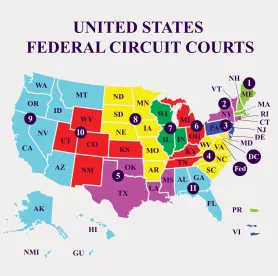In Lee v. Fisher, No. 21-15923, 2023 U.S. App. LEXIS 13521 (9th Cir. June 1, 2023), the United States Court of Appeals for the Ninth Circuit, sitting en banc, affirmed the dismissal of a shareholder derivative complaint alleging, among other things, violations of Section 14(a) of the Securities and Exchange Act of 1934 (the “Exchange Act”), 15 U.S.C. § 78n(a), and SEC Rule 14a-9, 17 C.F.R. § 240.14a-9 (collectively, the “Proxy Claims”), enforcing a forum-selection clause in the defendant company’s bylaws designating the Delaware Court of Chancery as the exclusive jurisdiction for adjudicating any derivative claims involving the company. By affirming the dismissal, the Ninth Circuit called into question whether the Proxy Claims were properly classified as derivative claims, noting that the Exchange Act’s antiwaiver provision was not triggered when the shareholder plaintiff could pursue the Proxy Claims directly in federal court. The Ninth Circuit’s decision creates a circuit split with the Seventh Circuit’s decision in Seafarers Pension Plan ex rel. Boeing Co. v. Bradway, 23 F.4th 714 (7th Cir. 2022), raising the specter that the United States Supreme Court eventually will weigh in on the issue.
The defendant company is headquartered in California and incorporated in Delaware. Its bylaws included a forum-selection clause designating the Delaware Court of Chancery as having exclusive jurisdiction over any shareholder derivative actions involving the company. A putative shareholder of the company filed a derivative action against various corporate insiders alleging that the company’s 2019 and 2020 proxy statements included false or misleading statements regarding the company’s diversity and inclusion efforts. The plaintiff alleged purportedly derivative Proxy Claims under the Exchange Act and state law claims for breach of fiduciary duty, aiding and abetting breach of fiduciary duty, abuse of control and unjust enrichment.
The company moved to dismiss the complaint on grounds of forum non conveniens, arguing that the forum-selection clause designated the Delaware Court of Chancery as the exclusive jurisdiction to adjudicate the shareholder plaintiff’s derivative complaint. The United States District Court for the Northern District of California granted the motion. The shareholder plaintiff then appealed the dismissal to the Ninth Circuit. A three-judge panel of the Ninth Circuit affirmed the dismissal. In an en banc decision, the Ninth Circuit again affirmed.
The plaintiff made three arguments on appeal. First, the plaintiff argued the district court’s decision to dismiss the Proxy Claims violated the antiwaiver provision in Section 29(a) of the Exchange Act. Second, the plaintiff contended the dismissal violated the federal forum’s alleged strong policy of allowing a shareholder to bring derivative Proxy Claims under the Exchange Act in a federal forum. Third, the plaintiff argued the forum selection clause was invalid as a matter of Delaware state law under Section 115 of the Delaware General Corporation Law (DGCL).
The Ninth Circuit rejected each of the Plaintiff’s arguments. The antiwaiver provision of the Exchange Act was not implicated by the enforcement of the forum selection clause because Section 29(a) only prohibits the waiver of substantive rights under the Act. Because a forum-selection clause only alters which forum can adjudicate a claim, the plaintiff’s substantive rights were unaffected under Shearson/Am. Exp., Inc. v. McMahon, 482 U.S. 220 (1987). The plaintiff argued that while the forum-selection clause was purportedly procedural, it indirectly affected substantive rights because it foreclosed the prosecution of the Proxy Claims through a derivative action.
The Exchange Act provides that federal courts have exclusive jurisdiction over claims under the Exchange Act. But with the forum-selection clause in effect, the Delaware Court of Chancery would be the only forum eligible to hear the derivative action. In other words, there would be no proper forum for prosecuting the Proxy Claims derivatively. The Court was not persuaded. Citing Kramer v. W. Pac. Indus., Inc., 546 A.2d 348 (Del. 1988), it held that the Proxy Claims were direct under Delaware law. Accordingly, the plaintiff could bring the Proxy Claims in a direct action as an individual or as part of a class of shareholders and thus there was no waiver of the plaintiff’s substantive rights.
The plaintiff next argued the Delaware forum-selection clause was invalid under Section 115 of the DGCL. The Ninth Circuit held Section 115 inapplicable because its purpose is to regulate the forum for “internal corporate claims” under the DGLC — but, the Proxy Claims under the Exchange Act are not properly understood as internal corporate claims. Moreover, because Delaware law interprets Section 115 as permissive, rather than restrictive, its silence with respect to the treatment of federal claims does not prohibit the application of a Delaware forum-selection clause to such claims.
The Court acknowledged that its interpretation of Section 115 was at odds with the Seventh Circuit’s interpretation in Seafarers, which held that Section 115 does not authorize a forum-selection clause that defeats exclusive federal jurisdiction under the Exchange Act. Nevertheless, for the reasons summarized above, the Ninth Circuit declined to follow the Seventh Circuit’s interpretation of Section 115.
With the Ninth Circuit siding with the Company, the Court appeared to be concerned that derivative plaintiffs could plead unnecessary putative “derivative” claims under the Exchange Act to invalidate Delaware forum-selection clauses with respect to an entire derivative lawsuit. The better rule is that Proxy Claims under the Exchange Act are properly classified as direct claims and enforcing a Delaware forum-selection clause with respect to related derivative claims does not (and cannot) act as a waiver of a plaintiff’s direct claims under the Exchange Act. As a result of the split between the Ninth Circuit and Seventh Circuit, the continued viability of derivative Proxy Claims under the Exchange Act will be an issue for the Supreme Court to decide.




 />i
/>i

